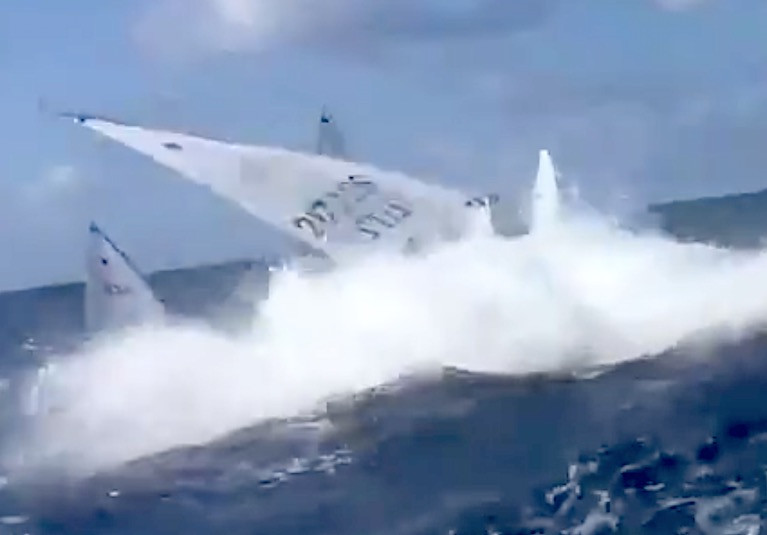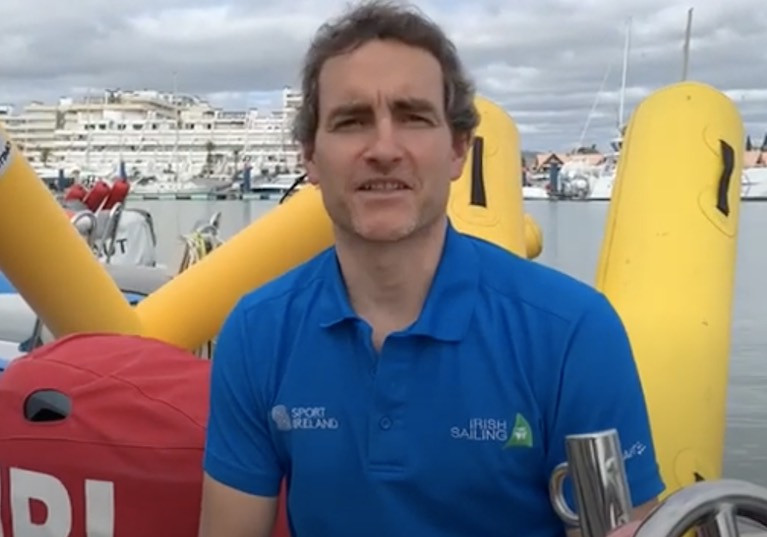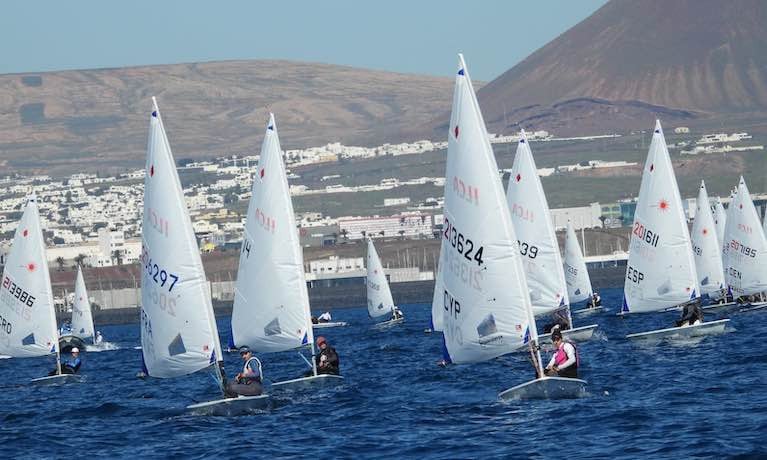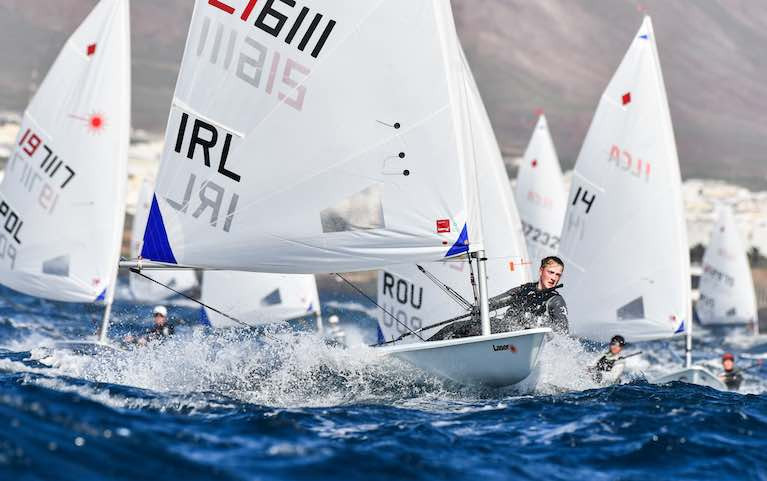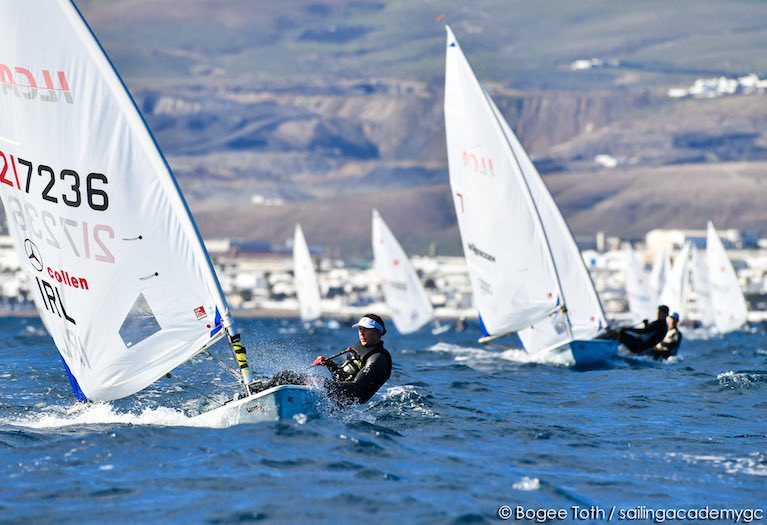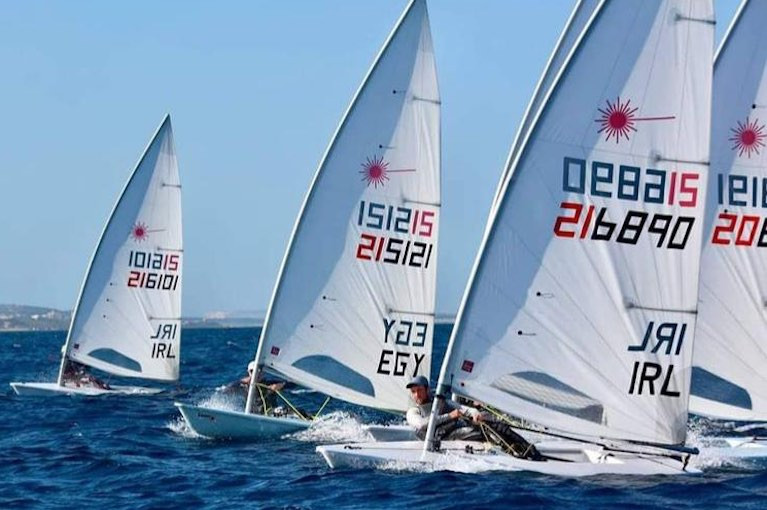Displaying items by tag: Annalise Murphy
Annalise Murphy (National YC) revelled in the strong wind conditions winning four consecutive races in the Radial Silver fleet of the Vilamoura International Regatta to win the second fleet overall.
It will be small consolation for Ireland's Olympic silver medallist, however, who knows full well that with less than 70 days to go to Tokyo, the battle is well and truly on to improve her consistency if she is to deliver on her gold medal ambition. The point was reinforced by the fact that the Rio bronze medalist, Anne Marie Rindom won overall by a significant margin (39 points) in the Danish girl's own preparations for Enoshima Bay.
Aoife Hopkins and Eve McMahon, both of Howth YC finished 6th and 9th respectively in the 44-boat Silver fleet.
Full results here
Vilamoura Sea Breeze Does Not Suit Irish Women at ILCA European Continental Qualifier
A building southwesterly sea breeze did not seem to suit the Irish women on day three of the 2021 ILCA Vilamoura European Continental qualifier for the Olympic single-handed dinghy.
In the two races, the best any of the three could manage was the 20th place scored by HYC's Aoife Hopkins who paired that with a 32nd to lie in 51st place overall. Annalise Murphy (NYC) (25,43) is four places behind in 55th, while Eve McMahon (HYC) is in 77th following a 43rd and 20th in the 89-boat fleet.
None of the Irish women qualifies for gold fleet racing tomorrow.
 A race start of the 2021 ILCA 6 Vilamoura European Continental qualifier for the Olympic single-handed dinghy Photo: Joao Costa Ferreira
A race start of the 2021 ILCA 6 Vilamoura European Continental qualifier for the Olympic single-handed dinghy Photo: Joao Costa Ferreira
Denmark's Anne-Marie Rindom, bronze medallist in Rio in 2016, continued to exert her dominance adding a fourth race win and discarding an 11th place to give her an eight point lead at the halfway stage.
Racing continues tomorrow. Full results here
Annalise Murphy is Mid Fleet After Day One of ILCA Vilamoura European Continental Qualifier
Day one of the 2021 ILCA Vilamoura European Continental qualifier for the Olympic single-handed dinghy (M&W) was sailed in a six to 15 knot southwesterly, backing during the day.
The women's ILCA 6, formerly known as the Radial dinghy, got their two races in first, Rio Bronze medallist and 2019 World Champion Anne-Marie Rindom (DEN) taking two wins to tie the overall lead with Vasileia Karachaliou (GRE).
Annalise Murphy of the National Yacht Club (already nominated for Tokyo) and who has described this regatta as 'just a training event' scored 29,8 to lie 34th overall, while Aoife Hopkins of Howth Yacht Club is 38th (15,23) and Eve McMahon, also HYC is 77th (39,33) in the 89-boat fleet.
Racing continues tomorrow. Full results here
Annalise Murphy's Olympic Bid Gets Mercedes Benz Boost
Mercedes-Benz has added further wind to the sail of Irish sailing star Annalise Murphy as she ramps up her preparations for the forthcoming Tokyo Olympics, due to take place later this year.
Radial helmswoman Murphy, who won Olympic silver in Rio, is the only Irish nominated sailor for Tokyo so far.
In a move that sees Mercedes-Benz retain its status as the only vehicle manufacturer supporting Annalise’s bid for further Olympic glory, the company has renewed their backing for the 31-year old Rathfarnham native who will continue to drive a top-of-the-range X-Class pickup for use in transporting her Laser Radial, her team and her equipment to events, here in Ireland and overseas.
 Annalise Murphy competing at her winter training base in Lanzarote
Annalise Murphy competing at her winter training base in Lanzarote
Finished in the now familiar yet eye-catching Kabara black, silver and grey livery, her 190hp X-Class is festooned with features fit for a sailing star. Amongst them are 4MATIC 4x4 automatic transmission, chrome style bar, reversing camera, cruise control power, rear sliding window and a style pack that includes roof rails and side steps.
Wishing the Olympic silver medal winner of the National Yacht Club every success on her road to Tokyo, Mercedes-Benz commercial vehicles sales manager, Fergus Conheady says: “Mercedes-Benz is proud to extend its support to one of Ireland’s leading medal contenders in her quest to achieve further success.”
Big Waves in Lanzarote Lead to Annalise Murphy's First Ever 'Back Flip' in a Laser Dinghy
A massive breaking wave capsized Ireland's Olympic silver medalist sailor Annalise Murphy yesterday during training in Lanzarote.
As Ireland's only sailor so far nominated for Tokyo, Murphy continues to train with some of her rivals in the Canary Island's this week. The training camp has certainly been getting conditions they can expect in Japan this July at the Tokyo Olympic venue.
Of course, the National Yacht Club ace is well used to such big seas on her own Dublin Bay but she declared on social media that yesterday's Canary capsize was her first-ever experience of a 'backflip' in a Laser.
The footage is certainly dramatic (below).
I did my first ever backflip in a laser today! pic.twitter.com/sP0UAjznsi
— Annalise Murphy (@Annalise_Murphy) February 6, 2021
Murphy, dropped back to fifth overall at the end of the ten race Lanzarote Winter Series Regatta in January, having held second overall in the ILCA 6 fleet until the penultimate day. It was a result that led to an honest review of her first regatta since the Euros in Poland last October.
With 'Uncertainty in the Air', Irish Olympic Sailors 'Plough Ahead' for Tokyo 2021
Irish Olympic Sailing boss James O’Callaghan was in climes sunnier than the team’s Dun Laoghaire Harbour Olympic Sailing HQ when he reported back to the Olympic Federation of Ireland last week on successful results achieved at January's training regatta in the Canary Islands.
As Afloat reported previously, Annalise Murphy took fifth overall in the ILCA Six class and Finn Lynch seventh in the ILCA Seven class at the Lanzarote Winter Series, a regatta that grew in significance in the pandemic. As the international calendar is disrupted for a second year, the January event gave Murphy, Lynch and other Irish campaigners the chance to be back on the race course for the first time since October's European Championships in Poland.
It is reported that conditions in Lanzarote are very similar to those the sailors will face in Hiroshima, Tokyo, where the sailing events of the next Olympic Games will be held in late July. So much so, that even Japanese teams have decided to change their home for the Canary Islands to prepare for the big event. "Lanzarote is very similar to Hiroshima, with a lot of wind and big waves. Moreover, here we have sun, good weather every day and a lot of activities that allow us to prepare ourselves outside of the water as well. That is why we decided to come to the Canary Islands," says Eri Hatayama, a Japanese Nacra 17 sailor.
The Team Ireland Performance Director for Sailing said it was a ‘great opportunity to continue the training’ and to 'keep the sailors busy and focussed on the job'.
O’Callaghan said there was some ‘uncertainty in the air’, as the Olympic circuit was curtailed by COVID. It's a situation made even more uncertain by the fact that Ireland has only one boat qualified (Laser Radial/ILCA Six) for Tokyo so far. The two other berths Ireland still seeks are totally reliant on Euro qualification regattas, one of which was postponed last week.
Having missed earlier qualification chances as far back as 2018 Ireland’s chances are now tied to the onset of the pandemic across Europe and the hope that the remaining places can be settled by racing rather than historical results as the staging of the Games itself comes under scrutiny.
For the moment, O'Callaghan says he is 'ploughing ahead' with team plans.
See the youtube clip below.
Annalise Murphy's Lanzarote Winter Regatta
Meanwhile, the National Yacht Club's Murphy has given her own candid assessment of her Canary Island performance on social media.
In an honest review, uncomplicated by coach-speak, the Rio medalist declared "I am very happy with some aspects of my sailing but somehow I can still be a total idiot when racing, even though I feel that at 30 years of age I should be making less stupid mistakes!"
She signed off the Instagram self-appraisal by thanking the host club and congratulating Denmark's Anne Marie Rindom on her Lanzarote victory, a sailor Murphy beat in Rio to win Olympic silver four years ago.
Fifth for Annalise Murphy at Lanzarote's ILCA 6 Winter Regatta
Annalise Murphy, Ireland's only sailor qualified for Tokyo so far, dropped back to fifth overall at the end of the ten race Lanzarote Winter Series Regatta today, having held second overall in the ILCA 6 fleet until the penultimate day.
Lighter conditions did not suit the Dun Laoghaire Olympic silver medalist who had an ultra-consistent opening seven-race results of 3, 2, 2, 2, 1, 6, 4 before counting a 33, 17, 19 and 20.
Counting six race wins in her tally, Anne Marie Rindom of Denmark topped the training regatta and was followed home by 2017 Under-21 world champion Maria Erdi of Hungary. Third was Vasileia Karachaliou of Greece.
Murphy's training partner, 16-year-old Eve McMahon of Howth Yacht Club was 24th in the 40-boat fleet.
Results here.
Lanzarote's Lighter Winds Frustrate Irish Olympic Sailors on Penultimate Day of Winter Series
Annalise Murphy has dropped to fourth overall in the ILCA 6 class after a penultimate day of lighter wind conditions at the Olympic classes Lanzarote Winter Series in the Canary Islands.
The 2016 Irish Olympic silver medalist had overhauled regatta leader Anne Marie Rindom of Denmark by a single point after race eight today and moved briefly into the overall lead but after a 17 scored in race nine this afternoon, the National Yacht Club solo sailor was back in fourth overall with a scoresheet so far of 3,2,2,2,1,6,4,33 and 17.
Conditions were much lighter today than the first two days of rig busting weather in the Canaries competition with easterly winds from six to 13-knots.
Howth Yacht Club's Eve McMahon is lying in 25th place in the 40-boat fleet.
Finn Lynch drops back to ninth
The National Yacht Club's Finn Lynch has dropped back from sixth to ninth overall in the ILCA 7 fleet of 31 boats.
A win for Lynch in race eight provided his best result of the series so far but otherwise, a 21 and 22 scored in today's other two races put the Rio Olympian back three places overall with 76 points overall and a scoreline to date of 14, 2, 6, 7, 22, 3, 21, 1 and 22.
Ewan McMahon returned to the fleet today after an eye injury sustained on Tuesday kept him out of three races. The Howth sailor is lying 23rd overall. Tom Higgins of the Royal St. George Yacht Club did not compete.
The final races of the series including a medal race will be held on Thursday.
Results here.
Olympic silver medalist Annalise Murphy marked her return to competition after a three-month break with a second overall after the first day of competition in the ILCA 6 (Laser Radial) at the Lanzarote Winter Series in the Canary Islands yesterday.
The National Yacht Club ace is on seven points after three races sailed, four points behind Denmark's Anne Marie Rindom who took three straight wins in the perfect sailing conditions that prevailed off the Arrecife coast.
As Afloat reported yesterday, a 39-boat fleet drawn from 25 countries is contesting the 14-race regatta that runs until Thursday as part of its winter training schedule.
The only Irish sailor so far qualified for Tokyo 2021 scored 3, 2, 2 in her boat named 'Ricky Bobby'.
Howth Yacht Club's Eve McMahon counted a 'Did Not Compete (DNC) in race two and is placed 30th.
Finn Lynch lying sixth
In the men's ILCA 7 (Laser) class, Murphy's club mate Finn Lynch lies sixth overall in a 30-boat men's Laser (ILCA 7) fleet from 14 countries.
The fleet includes Robert Scheidt but the Brazilian legend, who is the holder of two gold medals, two silver medals and a bronze from five Olympic Games, is not having things his own way with France's Jean Baptiste Bernaz leading by four points and Lynch beating Scheidt in race two.
Howth Yacht Club's Ewan McMahon lies 11th and Tom Higgins of the Royal St. George Yacht Club is in 30th.
Results here.
Olympic Silver Medalist Annalise Murphy & Irish Laser Team Return to Action in Lanzarote Winter Series
Ireland's Olympic silver medalist sailor Annalise Murphy returns to action in the Canary Islands this morning, her first regatta since the European Championships in Poland last October.
The only Irish sailor so far qualified for Tokyo 2021 will compete for 14 races (including a medal race) in her boat 'Ricky Bobby' in the Lanzarote Winter Series til Thursday.
With 25 weeks to Tokyo, the Canarian regatta has attracted a fleet of 45-boats including one or two of Murphy's main rivals for July's Olympic Regatta. The presence of Denmark's 2015 World Champion Anne Marie Rindom, for example, means it is unlikely the National Yacht Club ace will have things entirely her own way.
Murphy is not the only Irish Radial sailor in action on the Spanish archipelago either with Howth Yacht Club teen Eve McMahon entered for the series that sees four races scheduled today.
Irish Laser men in Lanzarote
Some of Ireland's Olympic men's Laser team including the National Yacht Club's Finn Lynch, Howth's Ewan McMahon and Royal St. George's Tom Higgins are also entered but there is no entry in the 48-boat fleet for Ballyholme's Liam Glyn who posted a personal best last October in the Laser Europeans in Poland.
As regular Afloat readers know, the Irish men are in a scramble for one of the last Laser berths for Tokyo that will be decided in Hyeres in April. Ireland is close to the standard required to qualify the nation but at the same time with rivals Spain, Italy, Belgium and Greece all neck and neck, the challenge is clear.
Afloat understands other IRL sailors are on the Spanish Island this week and may yet decide on a last-minute entry, boosting the Irish presence.
No doubt this morning's dinghy park chat will be around the recent denial of the reports that the Tokyo Games are to be cancelled due to COVID.
As Afloat reported previously, the Irish sailors have not been based at their Dun Laoghaire performance HQ but instead on the continent, winter training in the warmer climes of Portugal and Malta.
All sailors were required to sign a covid declaration for this week's regatta.
The schedule for the ILCA 6 (Radial) & ILCA 7 (Laser) event is:
- 4 races (Monday)
- 4 Races Tuesday
- 4 Races Wednesday
- 2 races on Thursday including a medal race


























